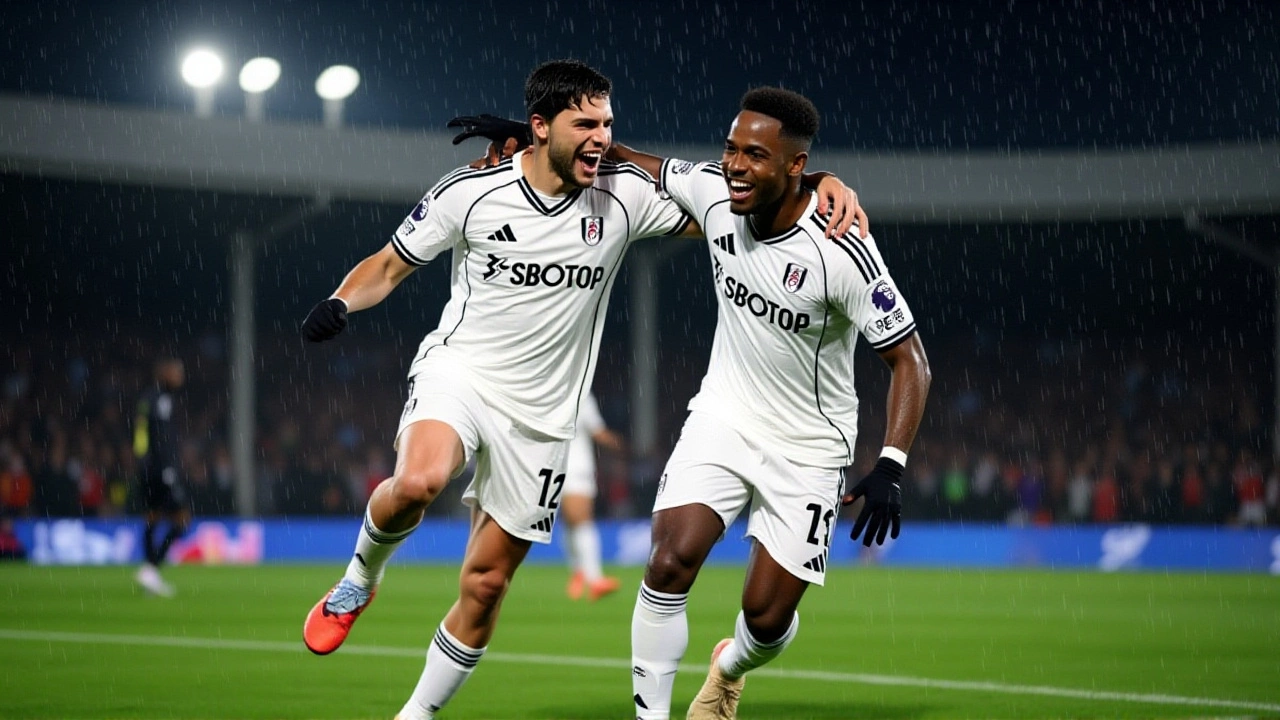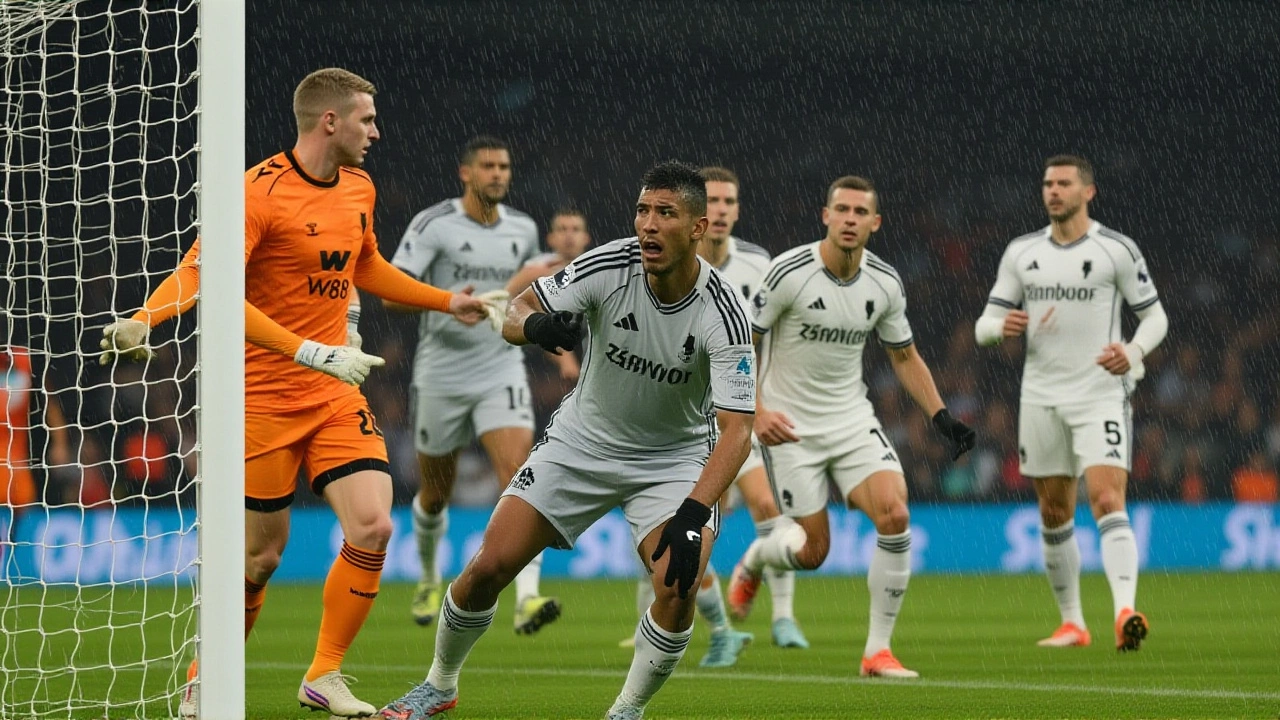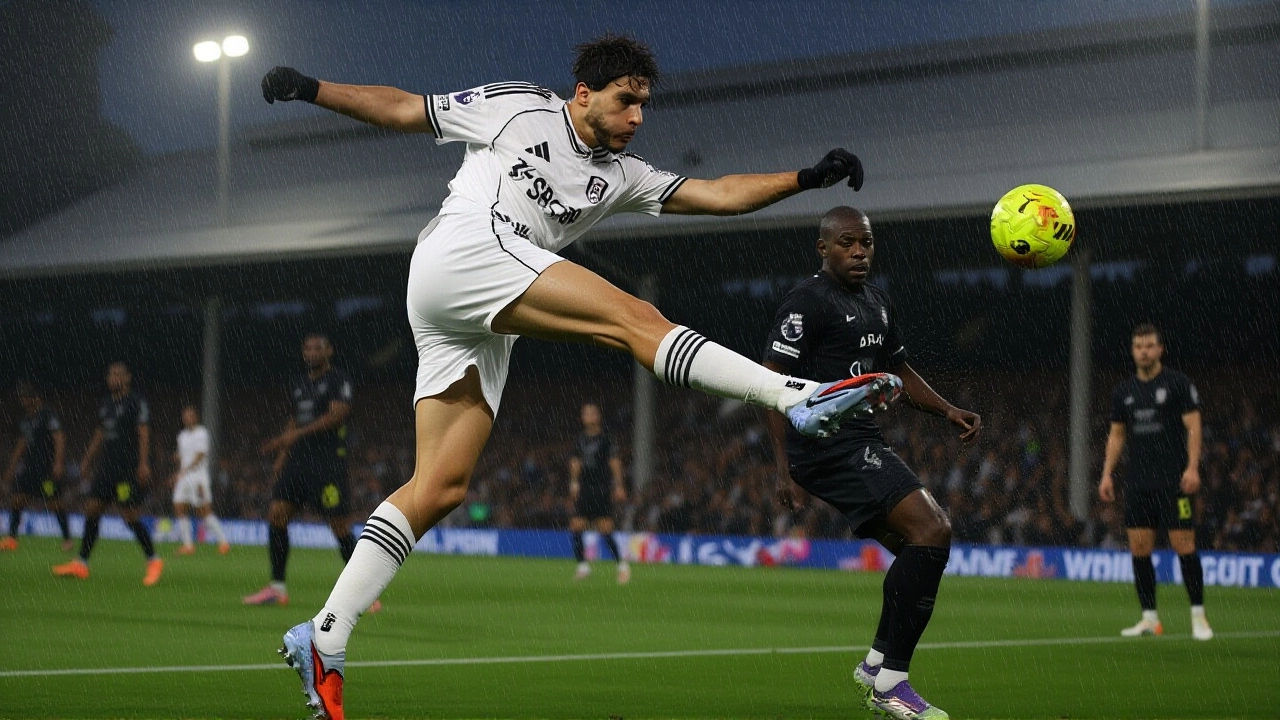It wasn’t pretty. It wasn’t clean. But in the pouring rain of West London, it was perfect. Raúl Jiménez, 34 and far from his peak, rose above the slick turf at Craven Cottage to nod home a 84th-minute winner against Sunderland — a goal that felt like a lifeline for Fulham and a dagger to Sunderland’s top-half hopes. The 1-0 win on Saturday, November 22, 2025, wasn’t just about three points. It was about survival, spirit, and a manager on the brink of signing a new deal who finally got the result his team had been begging for.
When the Rain Stopped the Game — But Not the Fight
The weather didn’t just affect the pitch — it defined the match. ESPN’s Rob Dawson called it a “West London monsoon.” The ball skidded. Players slipped. Passes went astray. And yet, Fulham kept coming. They had 30% possession — not dominant, but relentless. Sunderland, by contrast, sat deep, packed their backline, and relied on counters. They had 25 clearances to Fulham’s 13. Four saves to two. Five offsides to one. More fouls. More yellows. But they didn’t have the killer instinct.
At one point, early in the second half, Enzo Le Fee fizzed a shot just wide of Bernd Leno’s post. Later, Harry Wilson dragged a chance wide after a slick pass from Ryan Sessegnon. Substitute Emile Smith Rowe blasted over from 18 yards. Each time, the crowd held its breath. Each time, the rain kept falling.
The Moment That Changed Everything
Then, in the 84th minute, it happened. Samuel Chukwueze — quick, tricky, always a threat on the left — cut inside and floated a cross into the six-yard box. Dan Ballard, Sunderland’s young defender, lunged. He didn’t get enough on it. And there was Raúl Jiménez, timing his run like a man who’s been here before. He didn’t need power. Just precision. A gentle prod. The ball rolled past Roefs and into the net. The stadium erupted. The rain didn’t stop. But for a moment, everything else did.
It was Jiménez’s third goal of the season. His first in six league games. His most important by far. And Chukwueze, who had been hounded all night, got the assist. The kind of moment that turns a decent performance into a memorable victory.
Sunderland’s Grit Wasn’t Enough
Let’s be clear: Sunderland didn’t lose because they were bad. They lost because they were brilliant at holding on — until they weren’t. Granit Xhaka, the veteran Swiss midfielder, marshalled their midfield like a general holding a fortress. He intercepted, he tackled, he dictated tempo. But even he couldn’t stop the inevitable when the pressure mounted. His team had kept clean sheets in four of their last five games. They’d drawn with Arsenal. They’d beaten Newcastle. They were sixth in the table with 19 points. And then, in the 84th minute, the wall cracked.
Reinildo Mandava’s last-ditch tackle on Wilson was heroic. So was Roefs’ early save when his heavy touch almost gifted Josh King a tap-in. But football, especially in conditions like these, rewards persistence. Fulham kept asking questions. Sunderland kept saying no — until the final question came.

Why This Win Matters More Than the Table
Fulham are now 4-2-6, 14 points. Still in the relegation zone, but only two points off 17th place. Their four wins? All at home. That’s not luck. That’s character. And it’s exactly what Marco Silva needed. Reports surfaced this week that the club offered him a new three-year contract. He’s been under pressure. A shaky start. A shaky defense. A lack of goals. But this? This was the kind of win that silences doubters. The kind that reminds players they’re fighting for something bigger than survival — they’re fighting for identity.
Sunderland, meanwhile, saw their five-game unbeaten run end. They’re still sixth, but the cracks are showing. They’re too reliant on defensive discipline. Too fragile when the pressure builds. And without a goalscorer who can turn a chance into a goal — they’ll keep losing these tight games.
What Comes Next?
Fulham host Manchester United next. A daunting fixture. But after this? They’ll believe. Silva’s contract talks are likely to be formalized soon. And if Jiménez can keep scoring — even one every few games — they’ll stay up. Chukwueze is starting to look like a real threat. Smith Rowe, when fit, adds creativity. And Leno? He’s been quiet, but steady. Exactly what this team needs.
Sunderland face Tottenham next. They’ll need to find a way to score. Xhaka can’t do it all. Their defense can’t hold forever. And if they don’t start converting chances, that sixth-place finish could vanish before Christmas.

Behind the Numbers: The Real Story
StatMuse’s data tells one story. ESPN’s analysis tells another. But what the rain revealed was something deeper: Fulham wanted this more. Sunderland defended with grit. Fulham attacked with purpose. One team had the better stats. The other had the better heart.
Here’s the thing: Fulham didn’t dominate. They didn’t outplay. They just didn’t quit. And in the Premier League, especially in November, that’s often enough.
Frequently Asked Questions
How did the weather impact the match outcome?
The heavy rain turned Craven Cottage into a mud bath, reducing ball control and increasing errors. Sunderland’s higher clearance and save numbers reflected their defensive approach, but the slick surface made it harder to execute precise passes — a disadvantage for their counter-attacking style. Fulham’s persistence in keeping the ball alive in the final third, despite slipping and sliding, ultimately gave them the edge.
Why is Raúl Jiménez’s goal so significant for Fulham’s season?
At 34, Jiménez was seen as a fading force after injuries and poor form. His third goal of the season — and first since August — proves he’s still capable of decisive moments. With Fulham’s attack struggling for consistency, his ability to score in tight games could be the difference between relegation and safety. This goal may be the turning point that redefines his role and the team’s confidence.
What does this result mean for Marco Silva’s future at Fulham?
Silva was reportedly offered a new three-year contract just days before the match. This win, against a team that had been unbeaten in five, gives the board strong justification to finalize it. After a shaky start, this result shows he can adapt tactics under pressure and motivate his squad when results matter most — a key trait for a manager tasked with keeping Fulham in the Premier League.
How did Sunderland’s defensive stats mislead their performance?
Sunderland’s 25 clearances and 4 saves looked impressive on paper, but they revealed a team under constant siege. More clearances often mean more danger near your own goal. Their five offsides suggest they were caught out of position trying to press high. In essence, their stats weren’t a sign of strength — they were a sign of survival. And in football, survival isn’t enough when you need to win.
Why did Fulham dominate possession but not create more clear chances?
Sunderland’s compact five-man backline, led by Xhaka, denied Fulham space in the final third. Even with 30% possession, Fulham’s attacks often stalled at the edge of the box. Their best chances came from individual moments — Chukwueze’s cross, Smith Rowe’s drive — not sustained pressure. This highlights a deeper issue: they lack a true central striker who can hold up play and create space for others.
Can Sunderland recover after this loss?
They can — but they need to change. Their 19 points are solid, but their goal difference is just +2. They’ve drawn six games this season — too many. To climb higher, they need to convert one or two of those draws into wins. Without a consistent goalscorer beyond the midfield, they’ll keep losing narrow matches like this one. The next two games — Tottenham and Manchester City — will be a true test of their ambition.

